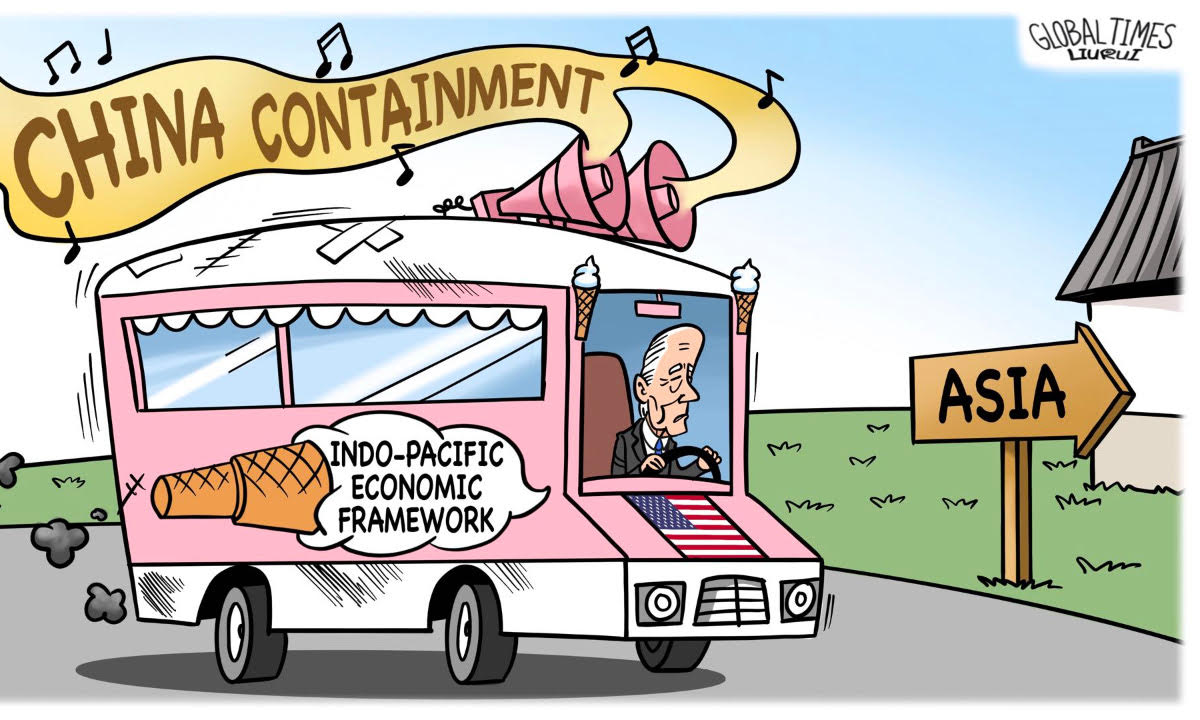Indo-Pacific Economic Framework will bring benefits or chaos

US President Joe Biden recently finished his first trip to Asia since taking office. One big move was to announce the launch of the Indo-Pacific Economic Framework (IPEF) in Tokyo. According to an official US statement, the IPEF will focus on trade, supply chains, clean energy, decarbonization, infrastructure, tax and anti-corruption efforts. If the purpose of this framework, as the US official claims, is to promote regional cooperation and prosperity and contribute to development and peace, then all regional countries, including China, will sincerely welcome it. But if we take off its bright and shining coat, another version of the IPEF can be seen.
The IPEF is a direct interference with the current properly functioning structure of Asia-Pacific economic cooperation. Over the years, It has become obvious that multilateral mechanisms, including the WTO, G20, APEC, ASEAN+ and RCEP, have greatly promoted economic development in the Asia-Pacific region and globally, making Asia a region with high acceptance of globalization and free trade and outstanding economic achievements. In sharp contrast, the US does not follow the free trade rules but promotes trade protectionism. It does not participate in Asia-Pacific economic cooperation (such as the CPTPP and RCEP) and even withdrew from the TPP that it started.
Now, Washington chooses to go its own way. The real purpose is to facilitate the dominance of American rules without opening its market or lowering tariffs, and ultimately to serve the updated version of "America First." Most countries in the world pursue a win-win economic exchange result and the rules followed are to give and take. But the US wants to pay less and get more.
The IPEF appears to be inclusive and open, but it provokes regional countries to decouple from China economically. Before the introduction of the IPEF, there was speculation that Washington would use it to escalate strategic competition and force the participating countries to choose sides, aiming to create a new economic circle without China. Perhaps to dispel these concerns, US National Security Advisor Jake Sullivan said China can also apply to join with the consent of its founding members - according to Hong Kong based media outlet Ta Kung Pao - which was intended to show the world the openness of the IPEF. While Sullivan's statement does not appear to exclude China, the positions of other senior Biden administration officials are less welcoming.
The IPEF's true intentions have been exposed. Commerce secretary Gina Raimondo said the IPEF provided regional countries with options other than China. US trade representative Katherine Tai said the IPEF will effectively counter China's growing influence.
During the TPP negotiations, former US president Barack Obama once said don't let China make the rules. As a result, China was excluded from the whole negotiation. The IPEF is copying this routine. As the largest economy in Asia, China has always been an advocate, a promoter and a defender of regional cooperation. It is also the largest trading partner of more than 120 countries and regions. At present, the world is facing economic difficulties and various crises, but the IPEF is trying to provoke countries in the region and decouple them from the Chinese economy.
In essence, the IPEF is the economic pillar of the "Indo-Pacific strategy" and a geopolitical tool for the US to encircle China. Although this strategy has been adjusted and modified by the Trump and Biden administrations, China has always been seen as a primary target. Whether the QUAD with its strong ideological color or the AUKUS focusing on security, both of them are important parts of the current strategy. In the eyes of US, the introduction of the IPEF makes up for the economic weakness in the competition with China in the Asia-Pacific region and also fills the gap caused by the Trump administration's withdrawal from the TPP.
On May 26, US Secretary of State Antony Blinken delivered a speech at The George Washington University. He reiterated the goal of full competition with China and also acknowledged that the US' ability to directly affect China was limited, so the US will focus on shaping the strategic environment around China. No matter how fancy or how well packaged it is, the core policy is to push regional countries to choose sides and build encirclement around China in order to prevent China from taking over the world leadership from the US. This can maintain the ideal world order for the US: one that it controls.
Over the years, the Asia-Pacific region has enjoyed prosperity and stability amid the chaos of today's world. The reason for this is win-win cooperation, rather than zero-sum confrontation. The US effort to interfere in regional cooperation, provoke decoupling and pressure other countries to participate in the confrontation between major powers shows the mind-set of the political elite in Washington, whose body has entered the 21st century but whose brain is still in the old era of the Cold War.
- The author is director of the research department with the National Institute of Strategic Studies at Tsinghua University. The article was published at global times.com.cn.



